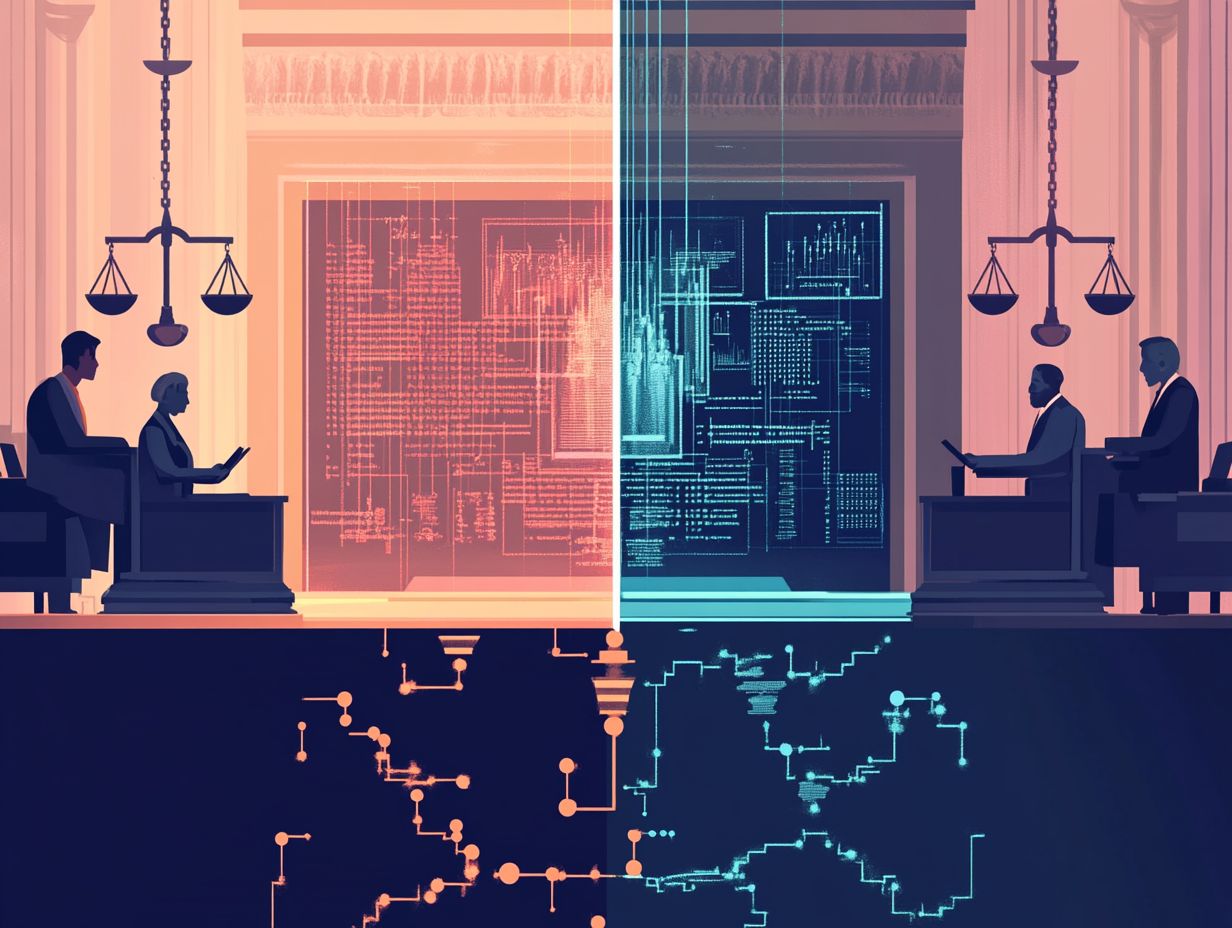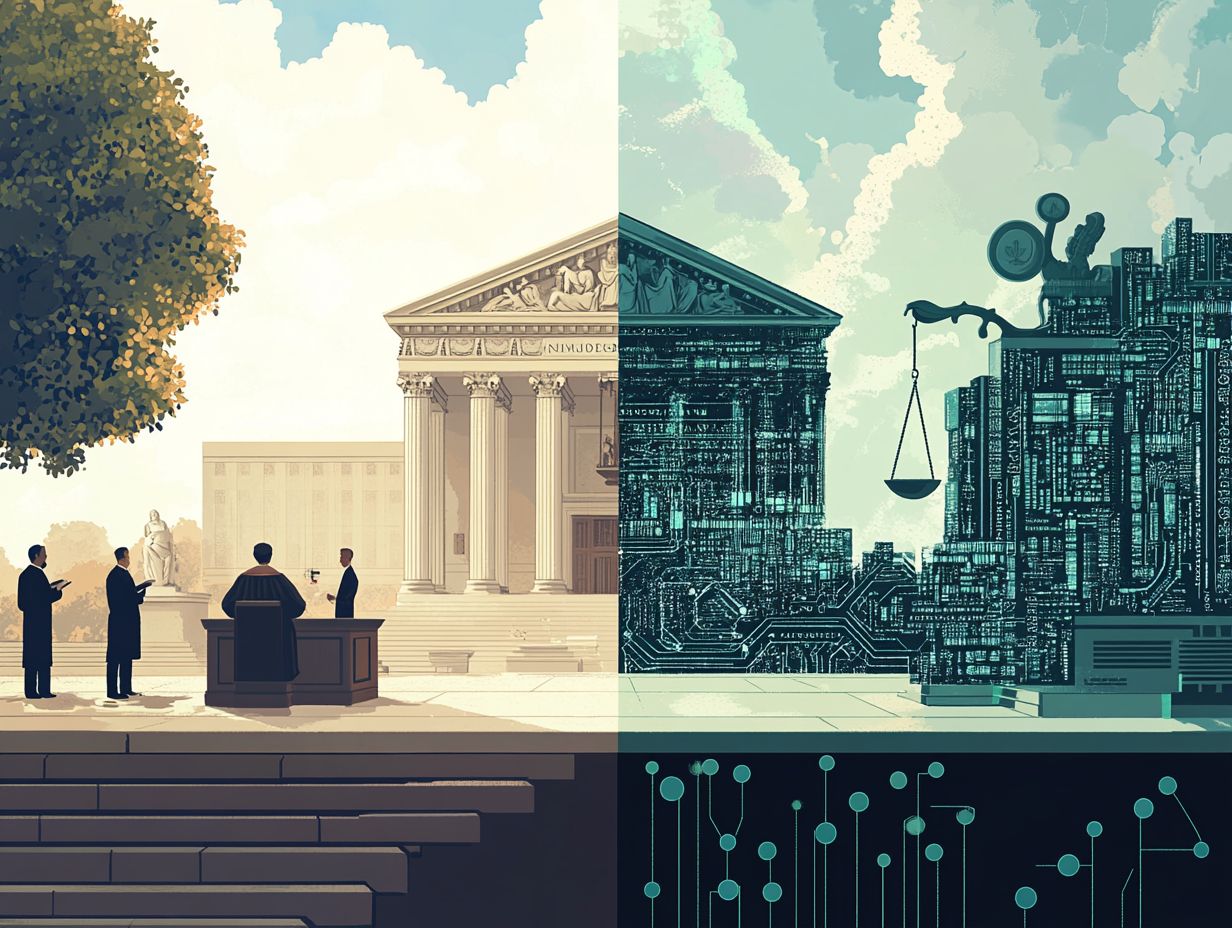5 Differences Between IP Litigation and Other Lawsuits
Intellectual Property (IP) litigation distinguishes itself from other types of lawsuits in several significant ways. Understanding these differences is essential as you navigate this complex landscape, given the unique legal frameworks and specialized courts involved.
Discover five crucial differences that set IP litigation apart, including the heightened stakes and the complex nature of the arguments presented. We will also examine the types of cases commonly encountered in IP litigation, the challenges businesses face, and effective strategies for protection and preparation.
Whether you are a business owner or simply intrigued by IP law, this guide offers valuable insights tailored to your needs.
Contents
- Key Takeaways:
- 1. Different Legal Basis
- 2. Specialized Courts and Judges
- 3. Unique Discovery Process
- 4. Higher Stakes and Costs
- 5. More Complex and Technical Arguments
- What Types of Cases Fall Under IP Litigation?
- Frequently Asked Questions
- What is the difference between IP litigation and other lawsuits?
- What are the types of intellectual property involved in IP litigation?
- How does IP litigation differ from other lawsuits?
- What are the potential outcomes of IP litigation?
- How do the costs of IP litigation compare to other lawsuits?
- What are some challenges of IP litigation?
Key Takeaways:

- IP litigation is based on different laws and principles than other lawsuits, requiring specialized knowledge and expertise.
- Specialized courts and judges handle IP litigation cases, providing a more focused and efficient process.
- The discovery process in IP litigation is unique, involving technical and complex arguments and evidence.
1. Different Legal Basis
The legal foundation for intellectual property (IP) litigation is intricate and multifaceted, combining different parts like patent infringement, copyright infringement, and trademark rights. This robust framework governs the protection and enforcement of exclusive rights related to creative works and innovations across diverse market sectors.
Each type of intellectual property has its own role:
- Patents protect inventions and processes, often requiring a thorough review by the U.S. Patent and Trademark Office before rights are granted.
- Copyrights safeguard original artistic expressions think music and literature managed under the U.S. Copyright Office’s jurisdiction.
- Trademarks establish brand identity and prevent consumer confusion, while trade secrets guard valuable business information from unauthorized access.
Grasping the legal nuances and federal regulations surrounding these areas is crucial, especially for those navigating the complex landscape of IP litigation. Enforcing rights in this realm can lead to significant financial implications, making it imperative to stay informed.
2. Specialized Courts and Judges
IP litigation often unfolds in specialized courts designed for this very purpose, where judges possess a deep understanding of the nuances of intellectual property law. This expertise ensures that judicial decisions are well-informed and critical to the outcomes of these cases.
Typically situated in federal venues, these courts focus exclusively on matters related to patents, copyrights, trademarks, and trade secrets. Judges in these courts typically hold advanced law degrees and have considerable experience in intellectual property issues. Many have even held roles in IP-centric legal practices or academic institutions, enhancing their qualifications.
This specialized knowledge helps judges navigate the complexities of each case with greater precision. As a result, their rulings not only adhere to the law but also take into account technological advancements and their broader implications. Ultimately, these decisions can profoundly impact innovation and industry standards.
3. Unique Discovery Process
The discovery process in IP litigation is uniquely intricate, demanding extensive and tailored strategies to uncover critical evidence, documents, and information relevant to infringement matters involving patents, copyrights, and trademarks. Discovery is the process of gathering evidence.
During this phase, you will likely collect technical documentation, design files, and internal communications that may reveal the intention or knowledge surrounding potential infringement. You must navigate various challenges, such as safeguarding sensitive proprietary data, utilizing protective orders, and preparing for resistance through motions to quash or limit discovery requests.
Depositions of key witnesses can offer invaluable insights into the operations of the parties involved, and with the rise of digital technology, electronic discovery has become increasingly vital. A deposition is when witnesses are questioned under oath.
All these components come together to form a robust strategy aimed at laying a solid foundation for your case and ensuring that the evidence collected effectively supports your claims or defenses.
Stay informed and protect your intellectual property your innovations deserve it!
4. Higher Stakes and Costs

IP litigation involves higher stakes and costs compared to other legal disputes. To navigate this complex landscape, it’s crucial to understand recent trends in IP litigation, as they can put your business at risk of significant financial penalties that affect its value and market position.
The expenses linked to these cases can be substantial, often ranging from tens of thousands to millions of dollars. This depends on the complexity and duration of the litigation. Such financial pressures may strain your resources, pulling funds away from critical areas like research and development or marketing initiatives.
Be aware of potential settlement costs, which could involve licensing fees or changes to your product lines, ultimately impacting your profitability.
Securing fair legal solutions, such as injunctions, can shift market dynamics and dramatically transform your company’s long-term viability and strategic positioning.
5. More Complex and Technical Arguments
IP litigation is complex and often requires specialized knowledge. You may need to hire experts to effectively handle issues like patent and copyright infringement.
These cases frequently encompass intricate details that may elude the average juror, highlighting the critical role of expert witnesses.
For example, in patent disputes, professionals with a strong background in engineering or software development can clarify the innovative aspects of a product, aligning its technical details with legal standards.
In copyright cases, experts in digital media are invaluable; they can assess the originality of a work and evaluate how similar it is to the allegedly infringing content.
By providing informed analyses, these witnesses enhance the credibility of the arguments presented and guide juries through the complexities of intellectual property law.
What Types of Cases Fall Under IP Litigation?
IP litigation encompasses various cases, including patent infringement, copyright infringement, trademark rights disputes, and trade secrets violations. Each of these requires tailored legal strategies, and understanding the 5 essential skills for IP litigation attorneys is crucial for effective enforcement.
Understanding these distinct categories is essential for anyone engaged in intellectual property law or working in industries that rely heavily on such protections.
For instance, in patent infringement cases, you often navigate intricate technical analyses that may require expert witnesses to substantiate claims about an invention’s originality.
In contrast, copyright infringement typically centers on the unauthorized use of creative works, often resulting in prompt legal remedies.
Trademark disputes focus on brand identity and consumer confusion, emphasizing the unique aspects of market perception.
Trade secret violations revolve around protecting confidential business information, which requires meticulous attention to how these secrets are safeguarded and disclosed.
Each type of case not only requires specific legal tactics but also outlines different enforcement strategies, leading to outcomes that range from financial damages to injunctions.
What Are the Key Differences Between IP Litigation and Other Lawsuits?
The key differences between IP litigation and other lawsuits arise from distinct legal frameworks, specialized courts, and specific infringement strategies that govern intellectual property rights. To explore more, check out 5 ways to leverage IP rights in litigation.
Unlike traditional tort or contract disputes, where the focus often revolves around damages or breaches of agreement, IP litigation emphasizes the validity of the intellectual property itself, making it crucial for lawyers to employ effective IP litigation tactics.
In patent cases, prior art becomes crucial for assessing an invention’s originality. The litigation process in intellectual property matters often involves complex legal standards, requiring specialized judges and attorneys well-versed in this intricate area of law.
These factors influence the strategies you employ and shape the overall duration and outcomes of the cases involved.
Stay informed about these crucial aspects to protect your business!
What Are the Main Challenges of IP Litigation?

IP litigation presents many challenges that require navigating the complexities of legal advice and addressing allegations of economic espionage. It also involves effectively using legal strategies to build a strong case.
These cases often have intricate legal hurdles, such as proving ownership and the validity of intellectual property. These issues can quickly become convoluted and time-consuming. Discovery issues may complicate access to essential documents and responses from the opposing party.
The technical nature of these disputes requires a solid understanding of both legal principles and the underlying technology. To tackle these obstacles, employing strategies like early case assessments and engaging expert witnesses is crucial.
Expert guidance can simplify complex information into persuasive arguments, ultimately helping you achieve a more favorable resolution for all parties involved.
How Can a Business Protect Itself from IP Litigation?
Don t wait actively protect yourself against IP litigation by using effective strategies. Engage in robust licensing negotiations, implement anti-counterfeiting measures, and maintain strong trademark rights.
These strategies not only strengthen your market position but also lay a solid foundation for sustainable growth. Actively registering your intellectual properties gives you legal recourse if infringements arise.
Integrating anti-counterfeiting technologies can significantly reduce the risk of unauthorized reproductions of your products. Collaborating with legal experts to create a comprehensive strategy can enable you to manage disputes proactively, reduce litigation costs, and reinforce your commitment to protecting your innovations.
What Are the Possible Outcomes of an IP Litigation Case?
The possible outcomes of an IP litigation case can vary widely, ranging from statutory damages and equitable relief to favorable judicial decisions affirming the rights of the parties involved.
These results can profoundly impact both you and your opponent, influencing your respective business operations and reputations. A ruling resulting in statutory damages may compel the losing party to pay a substantial amount, impacting their financial stability.
If a court grants an injunction, it could limit your ability to use certain technologies or products, leading to significant operational changes. A favorable ruling may bolster your company s market position, showcasing the strength of your IP assets.
Such outcomes not only shape individual cases but also establish precedents that can influence industry standards and future litigation strategies.
How Can a Business Prepare for an IP Litigation Case?
Proper preparation for an IP litigation case requires developing comprehensive legal strategies and gathering necessary documentation. Seeking expert guidance will help you navigate the complex litigation process effectively.
Begin with thorough internal assessments to identify potential vulnerabilities concerning your intellectual property. Collaborating with experts in IP law provides invaluable insights and helps refine your litigation approach.
Formulate tailored strategies reflecting your case’s unique circumstances, including potential defenses or counterclaims. This proactive stance reduces the chances of an unfavorable outcome and equips you to clearly articulate your position in any upcoming legal proceedings.
Frequently Asked Questions

What is the difference between IP litigation and other lawsuits?
IP litigation focuses specifically on intellectual property issues like patents and trademarks, and understanding the lessons learned from major IP litigation cases can provide valuable insights, while other lawsuits cover a broader range of legal matters.
What are the types of intellectual property involved in IP litigation?
The main types of intellectual property in IP litigation are patents, trademarks, and copyrights. Each provides legal protection for original creations and inventions.
How does IP litigation differ from other lawsuits?
IP litigation usually takes place in specialized courts, like federal district courts or IP courts. This process is often more complex, so it’s important to be aware of the pitfalls in IP litigation to avoid, which requires a solid understanding of IP laws.
What are the potential outcomes of IP litigation?
The outcomes of IP litigation can vary significantly. They may include injunctions, damages, or licensing agreements, focusing on protecting intellectual property rights.
How do the costs of IP litigation compare to other lawsuits?
Costs for IP litigation can be much higher than those for other lawsuits, primarily due to the need for specialized legal expertise and the complexity of the cases. Understanding the 5 major challenges in IP litigation today can help navigate these financial demands.
What are some challenges of IP litigation?
One challenge of IP litigation is its technical nature, often demanding specialized knowledge. For those navigating this complex field, following 5 tips for IP litigation success can be invaluable. The stakes are high, as the outcome can impact entire industries and markets.






